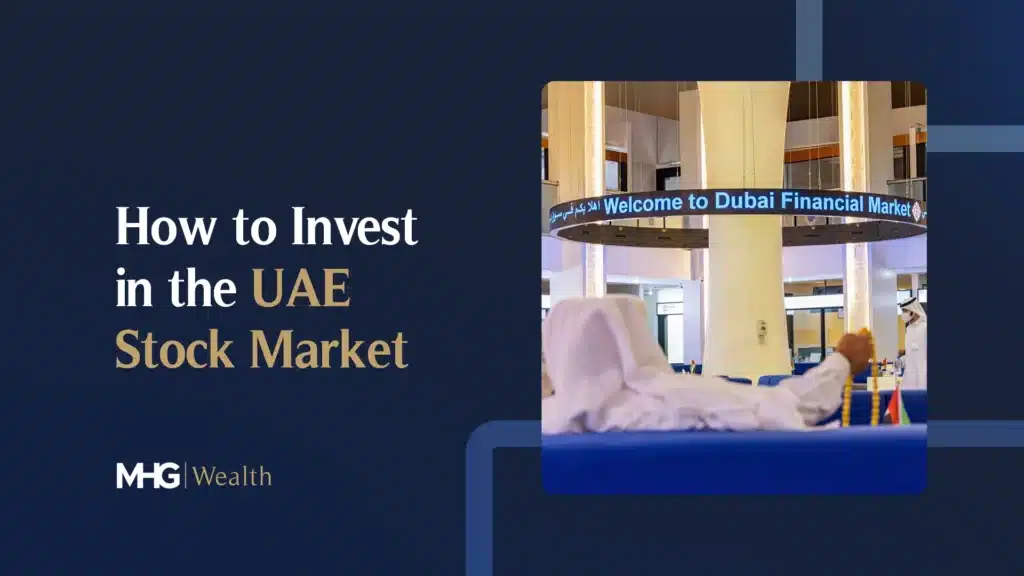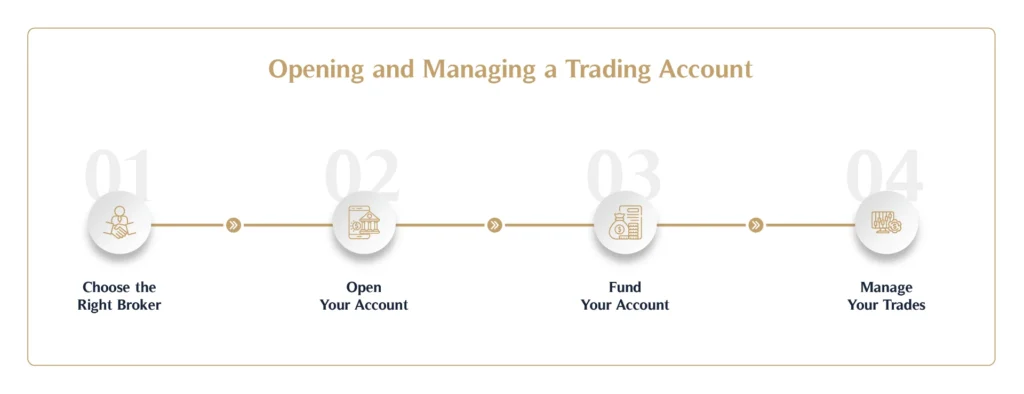Whether you’re a beginner or an experienced investor, investing in the United Arab Emirates (UAE) stock market is a great opportunity to build wealth and diversify your portfolio.
As a rapidly developing country, the UAE continues to attract more local and international investors seeking to protect and grow their wealth.
In this guide, we will show you how to invest in the UAE stock market and set yourself up for long-term financial success.
What is the Stock Market?
A stock market is an exchange where investors trade, sell, and buy company shares and other financial securities. It allows publicly traded companies to raise funds for further market expansion, repay their debts, etc.
On the stock exchange, you can invest in different types of financial products, including:
- Investment funds: Pool funds from multiple investors to purchase a variety of financial securities. They are run by a fund manager who invests on behalf of the individual investors.
- Hybrid securities: Combine two or more asset classes, such as bonds and stocks. Hybrids are typically marketed to institutional investors.
- Fixed income: Pay investors a fixed amount of money over a specific amount of time. Fixed income products (such as corporate and government bonds) typically carry less risk than stocks.
- Variable income: Pay investors a variable amount of money depending on the market performance. Variable income securities include stocks and some bonds.
While there are differences between various types of securities, they all have the same goal: making your money work for you.
Some of the world’s most well-known stock exchanges include the New York Stock Exchange, NASDAQ, and the London Stock Exchange.
In the UAE, you can buy stocks using three exchanges:
- Dubai Financial Market (DFM)
- Abu Dhabi Securities Exchange (ADX)
- NASDAQ Dubai
Both DFM and ADX were founded in 2000, while NASDAQ Dubai was launched in 2005.
Why You Should Buy Stocks in the UAE
Is the UAE stock market a viable option for international investors?
The answer is a resounding yes.
Industries such as tourism, real estate, and technology fuel the country’s fast-growing economy. In fact, recent forecasts estimate an economic growth of 6.2% in 2025.
Government policies also support investors—there is no income, capital gains, or corporate tax in the country. And it has double taxation agreements with over 140 countries, including the United Kingdom.
Additionally, investing in the UAE allows you to diversify your portfolio. Instead of keeping all of your investments in the European market, for example, you’ll spread them over multiple regions and reduce risk.
Lastly, there’s the potential for high returns. In September 2024, Dubai’s stock market reached a 10-year high after growing 12% in Q3, ranking it among the best-performing equity benchmarks globally.
But it’s not just stocks you should consider investing in. Purchasing different types of assets (such as property or private equity) in the UAE prevents you from putting all your eggs in the stock market basket, insulating you from unexpected economic downturns.
Speaking to an investment advisor will help you weigh different options and build a profitable portfolio consisting of different assets.
How to Buy Stocks in the UAE
To get started with investing in the UAE, the first step is to open an account with a brokerage firm. The DFM even offers a broker directory on their website to help you find one that best meets your financial needs.
The broker will help you get a National Investor Number (NIN) which is a requirement to participate in the stock market.
When evaluating different brokerage firms, note that they don’t always offer the same services:
- Full-service: Provide comprehensive wealth management services that include personalised investment advice, finding investing opportunities, and managing your portfolio.
- Online brokerage: Enable investors to manage their wealth and invest using a digital platform.
- Discount brokerage: Offer stock trading services without personalised wealth management or investment advice.
After you settle on a brokerage firm, it’s time to choose the stocks you’ll invest in. (If you opt for a full-service broker, they’ll guide you through this process.
Do plenty of research—dig into the company’s financials and pay attention to metrics such as revenue and profit margins. Look into their product development to get an idea of their future growth potential.
Also, remember to analyse broader industry trends and competitor moves that could impact the company’s market performance. For example, Facebook stock fell when Apple launched new privacy features in 2021 that impacted the social network’s advertising features.
Once you’re ready to invest, there are a couple of ways to purchase stock. Many brokerage firms in the UAE provide an online platform or mobile app where you can place stock orders easily. But it’s also possible to sell or buy stocks over the phone.
Factors to Consider Before You Buy Stocks in the UAE
One of the key factors to consider before purchasing stock in the UAE is your personal risk tolerance and investment goals.
Let’s say you’re investing in your retirement. In this case, a conservative investment portfolio that includes stocks alongside fixed income securities will balance out risk. Plus, it will prevent market volatility from taking a big chunk out of your pension pot.
Remember to read up on rules and regulations regarding investing. The Securities and Commodities Authority (SCA) is in charge of overseeing financial markets in the UAE, and their website contains a wealth of information regarding market rules and regulations.
The SCA website also includes a list of licensed companies (brokerage firms, investment fund managers, etc.) to help you make sure you work with trustworthy organisations.
When buying stocks, consider market trends and any geopolitical events that could impact your investments. Elections, oil prices, and employment figures are just a couple of examples to keep in mind.
Obviously, this is a lot of information to take in if you have little or no experience investing in the UAE. Take your time weighing different options and don’t hesitate to get help from wealth management experts such as MHG Wealth Management.
We help our clients with:
- Investment management (including alternative and property)
- Wealth management
- Retirement planning
- Financial advice (financial education, tax optimisation, estate planning, and accountability and monitoring)
Our approach to investments is holistic—we assist with allocating assets, buying and selling stocks, and continuous performance monitoring. We can also answer any specific questions about how to buy stocks in the UAE, helping you make the most informed decision.
When working with MHG Wealth, you’ll define your goals and research various investing options together with your investment advisor. Diversifying your portfolio with various asset classes is key since long-term success requires more than investing in an outperforming share.
Depending on your goals, combining stocks with commodities such as gold or silver could be the best path. Or you might invest in hedge funds alongside art and antiques. Regardless of your specific picks, MHG Wealth will support you with 360 portfolio management to minimise risks and increase returns.
How to Build a Stock Trading Plan
Building a solid stock trading plan is your first step toward successful investing in the UAE stock market. A trading plan acts as your roadmap, helping you make informed decisions, manage risks, and stay disciplined amid market fluctuations. Here’s how to create one effectively:
Understand Your Risk Appetite and Set Goals
Before you begin, identify your financial goals and risk tolerance. Are you investing for long-term growth, such as retirement, or seeking short-term gains? Understanding your risk appetite ensures you select investments that align with your financial objectives.
For example, if you prefer lower risk, you might allocate more to stable sectors like utilities and fixed-income securities. Conversely, if you’re willing to take on higher risks, you might explore emerging market opportunities or leveraged products for potential high returns.
Research and Capital Allocation
Capital allocation is critical. Divide your investment capital across various asset classes to balance risk and reward. A well-diversified portfolio minimises the impact of market volatility on your overall returns. For instance, you could allocate 60% to blue-chip stocks, 20% to real estate investment trusts (REITs), and 20% to alternative investments.
Learn more about diversifying investments through this guide: How to Invest Money in the UAE.
Tools for Risk Management
In stock trading, risk management tools are essential to protect your investments. Examples include:
- Stop-Loss Orders: Automatically sell your stock if its price drops below a specified level to limit losses.
- Technical Analysis Tools: Use charts and indicators to predict price movements and make data-driven decisions.
- Portfolio Diversification: Spread your investments across different industries to reduce exposure to a single sector.
Avoid Emotional Decision-Making
The stock market can be unpredictable, and emotional decision-making often leads to poor results. Create a trading plan structure that emphasises logic over emotion. Set rules for when to buy, hold, or sell, and stick to them.
Stay Updated on Market Opportunities
Finally, keep an eye on market opportunities. Regularly review your portfolio and adjust based on changes in the market dynamics, company earnings reports, or geopolitical events.
Opening and Managing a Trading Account
Opening a trading account in the UAE is your gateway to accessing the stock market.
Here’s a step-by-step guide to simplify the process:
Step 1: Choose the Right Broker
Begin by selecting a brokerage firm. Options include full-service brokers, online brokerages, and discount brokers. Each type offers different features:
- Full-Service Brokers: Ideal if you want tailored financial advice and portfolio management.
- Online Brokerages: Convenient for investors who prefer managing their investments through digital platforms.
- Discount Brokers: Suitable for experienced investors who don’t need advisory services.
When choosing a broker, ensure they are licensed by the UAE’s Securities and Commodities Authority (SCA).
Step 2: Open Your Account
To open a brokerage account, you’ll need to provide proof of identity (such as a passport) and proof of residence. The broker will also assist in obtaining your National Investor Number (NIN), a unique identifier required to trade in the UAE.
Step 3: Fund Your Account
Deposit funds into your brokerage account. Some brokers may allow you to start with a live account after a small initial deposit, while others may have higher minimum funding requirements.
Step 4: Manage Your Trades
Once your account is set up, familiarise yourself with the trading platform. Learn how to place market orders, limit orders, and stop orders. These tools give you flexibility in managing trades efficiently.
For example, a limit order enables you to specify the maximum price you’re willing to pay for a stock, ensuring you stick to your budget.
Types of Trading Accounts
- Brokerage Account: Ideal for standard trading. You deposit funds and buy or sell stocks through a broker.
- CFD Trading Account: Allows you to trade on price movements without owning the underlying asset, often used for leveraged trading.
- Live Account: For real-time stock trading with up-to-the-minute pricing.
Managing Your Trades
Once your account is set up, you’ll need to learn how to manage trades effectively:
- Limit and Stop Orders: Use these to automate your buying and selling based on preset price points.
- Monitor Open Positions: Keep track of your investments and adjust your strategy as needed.
- Leverage Expert Guidance: Work with a financial advisor to refine your approach and maximise returns.
Speculation vs. Investment
It’s crucial to differentiate speculation from investment when trading stocks in the UAE. Both have distinct characteristics:
Timeframe and Methods
- Speculation: Typically short-term, focused on price movements. Speculators often use derivative products and technical analysis.
- Investment: A long-term approach involving buying stocks or assets for steady growth. Investments often include dividend-paying shares and diversified portfolios.
Risks and Benefits
- Speculation: High risk due to market volatility and reliance on rapid price changes. For example, trading leveraged products can amplify gains but also magnify losses.
- Investment: Lower risk with a focus on steady returns. Diversifying your portfolio across multiple types of assets, such as stocks, bonds, and real estate, reduces exposure to market downturns.
Stock Market Dynamics
Understanding stock market dynamics helps you make informed decisions. Here are the key factors:
Share Price Influencers
- Company Earnings Reports: Positive earnings often lead to higher share prices.
- Sector Trends: Growth in sectors like tourism and real estate impacts stock performance in the UAE.
- Geopolitical Influences: Oil prices, regional conflicts, and trade agreements affect the market.
Regulatory Landscape
The Securities and Commodities Authority (SCA) oversees the UAE stock market. Regulatory changes can impact operations and investor confidence. Visit the SCA website to stay informed about new policies.
Role of Liquidity and Volatility
High liquidity ensures you can buy or sell stocks easily without affecting prices. Meanwhile, market volatility creates opportunities for traders to profit from price fluctuations. However, it also increases risks, highlighting the importance of robust portfolio management.
For insights on managing investments during market volatility, read: Saving vs. Investing.
Protect and Grow Your Wealth in the UAE
The future may be uncertain, but your finances don’t have to be. By purchasing the right stocks in the UAE, you’ll diversify your portfolio and benefit from a rapidly expanding economy.
Whether you’re just starting your investing journey or looking for a new investment opportunities in the UAE, the financial advisors at MHG Wealth are here to help you achieve your financial goals.
FAQs
What Are Some Good and Reliable Stock Trading Platforms in the UAE?
Popular platforms include the Dubai Financial Market (DFM) and Abu Dhabi Securities Exchange (ADX). They offer advanced tools and robust security for seamless trading.
How Can I Invest 1,000 AED in the UAE?
Start with a brokerage account and invest in diversified ETFs or blue-chip stocks to minimise risk while growing your capital over time.
What Is the Investor Number (NIN) and Why Do I Need It?
The NIN is a unique identifier for trading on UAE stock exchanges. It ensures your trades are secure and properly recorded.







